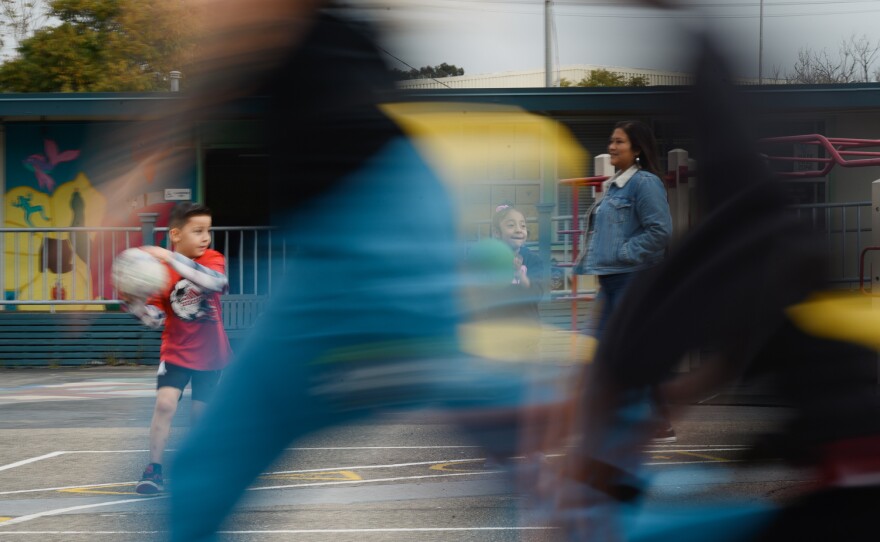Playtime is not only a source of fun for children — it's essential to their development and mental health. Over the past 30 years, researchers have seen a decline in children’s unstructured outdoor play, which could impact their mental health.
But parents can directly influence how their child plays and give them more opportunities to learn and explore independently. KPBS spoke to experts on child development and play to ask what parents can do to get their children the play time they need.
Give them space
“Children playing is what children are designed to do,” said Peter Gray, research professor of psychology at Boston College. “It's how they learn what makes them happy. It's how they gain confidence. It's how they make friends. And there are a number of advantages of playing outside as opposed to inside, one of which is that they can get away from their parents.”
Gray said free play is essential to a child’s mental development. Free play happens when children are playing on their own, making up their own games, and solving their own problems. Allowing children to play with each other without parents hovering allows them to develop confidence, be better able to communicate, and learn to deal with disagreements. It also allows them to learn from their own mistakes.
So when your child is playing with friends, it’s best to not hover: allow them to play freely. If you are really worried for their safety, Gray recommends having just one parent or grandparent there to act as a “lifeguard” in case of an accident.
“The major purpose of play is for kids to learn how to solve their own problems. So the parent is not there to solve the problems for the kids,” Gray said. “If there's something really dangerous happening, the parent is there. This is not going to happen, but some parents are worried that some kidnapper is going to come and steal a child. This doesn't really happen as often as parents think it happens.”
Share your interests and show interest in what they enjoy too
“Kids like to play with adults — so adults can model what they want their kids to do by doing it with them,” said Rebecca London, a professor of sociology at UC Santa Cruz.
If you want your children to be more enthusiastic about sports, make time to watch sports around them and share your love for your favorite teams or players. They’ll remember you sharing your passions with them.
Parents could also take their children on walks outdoors to familiarize them with the environment, and make it fun with a game too. Count the birds you see, or collect rocks to paint later.
“It's really about knowing your child and what they like to do,” London said.
She stressed allowing children to follow their interests. For example, if your child is fascinated by bugs, instead of enrolling them in dance class, pitch a neighborhood bug scavenger hunt.
More adventurous kids might like camping. It doesn’t have to be a grand trip to a national park — it can just be a backyard camping night. By giving kids the chance to find wonder in their own backyard, parents are facilitating an appreciation for the nature around them, she said.
Also, don’t be afraid of dirt. According to the National Wildlife Federation, playing in dirt has been found to strengthen children’s immune systems, reduce risks for cardiovascular inflammation and reduce anxiety.
Get to know your neighbors with kids and plan outside play with them
Many adults remember a time in their childhood when kids would come knocking on their doors to ask them to play outside, and children played freely in neighborhoods and playgrounds. Today, parents might be more hesitant to send kids outside alone. If you do, they’ll come back to tell you that there’s nobody to play with.
A dead end? Gray said it doesn’t have to be. Instead, parents can recreate a more lively neighborhood by first getting to know their neighbors, especially those with kids.
Then, they can pitch a plan.
“You arrange with these neighbors, ‘Why don't we all send our kids outdoors at the same time so they're all outdoors at once?’ Or let them have a little party initially to introduce them to one another. If parents know one another, the kids know one another,” Gray said. “And then once that's done, then let's figure out certain times in the week when they're all going to send their kids outdoors.”
Organizing days and times when the neighbors can encourage their kids to go outside makes the neighborhood more welcoming. After this first step, children might just start knocking on their friend’s door again.
Challenge kids to try something new
Parents and caregivers should also challenge their kids to try new things. One example is The Let Grow Project, where teachers give their students a simple assignment: “Go home and do something new on your own.”
Parents can share the program with their schools, or they can do a version of it at home.
It could be a ride around the neighborhood on their bike, or planting seeds for a small garden. By challenging them to push their boundaries, children can grow confidence in themselves and feel accomplished in their task, said Gray.
For more tips on parenting and play, check out the KPBS Parents Hub.










